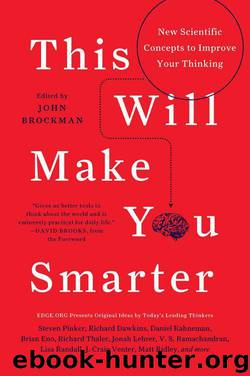This Will Make You Smarter: 150 New Scientific Concepts to Improve Your Thinking by Brockman John

Author:Brockman, John [Brockman, John]
Language: eng
Format: mobi, epub
Publisher: Harper Collins, Inc.
Published: 2012-02-13T16:00:00+00:00
William Calvin
Theoretical neurobiologist; emeritus professor, University of Washington School of Medicine; author, Global Fever: How to Treat Climate Change
An automatic stage of “compare and contrast” would improve most cognitive functions, not just the grade on an essay. You set up a comparison—say, that the interwoven melodies of rock and roll are like how you must twist when dancing on a boat when the bow is rocking up and down in a different rhythm than the deck is rolling from side to side.
Comparison is an important part of trying ideas on for size, for finding related memories and exercising constructive skepticism. Without it, you can become trapped in someone else’s framing of a problem. You often need to know where someone is coming from—and while Compare ’n’ Contrast is your best friend, you may also need to search for the cognitive framing. What has been cropped out of the frame can lead the unwary to an incorrect inference, as when they assume that what is left out is unimportant. For example, “We should reach a 2˚C (3.6˚F) fever in the year 2049” always makes me want to interject “Unless another abrupt climate shift gets us there next year.”
Global warming’s ramp-up in temperature is the aspect of climate change that climate scientists can currently calculate—that’s where they are coming from. And while this can produce really important insights—even big emission reductions only delay the 2˚C fever for nineteen years—it leaves out all of those abrupt climate shifts observed since 1976, as when the world’s drought acreage doubled in 1982 and jumped from double to triple in 1997, then back to double in 2005. That’s like stairs, not a ramp.
Even if we thoroughly understood the mechanism for an abrupt climate shift—likely a rearrangement of the winds that produce Deluge ’n’ Drought by delivering ocean moisture elsewhere, though burning down the Amazon rain forest should also trigger a big one—chaos theory’s butterfly effect says we still could not predict when a big shift will occur or what size it will be. That makes a climate surprise like a heart attack. You can’t predict when. You can’t say whether it will be minor or catastrophic. But you can often prevent it—in the case of climate, by cleaning up the excess CO2.
Drawing down the CO2 is also typically excluded from the current climate framing. Mere emissions reduction now resembles locking the barn door after the horse is gone—worthwhile, but not exactly recovery. Politicians usually love locking barn doors, as it gives the appearance of taking action cheaply. Emissions reduction only slows the rate at which things get worse, as the CO2 accumulation keeps growing. (People confuse annual emissions with the accumulation that causes the trouble.) On the other hand, cleaning up the CO2 actually cools things, reverses ocean acidification, and even reverses the thermal-expansion portion of rising sea level.
Recently I heard a biologist complaining about models for insect social behavior: “All of the difficult stuff is not mentioned. Only the easy stuff is calculated.” Scientists first do what they already know how to do.
Download
This Will Make You Smarter: 150 New Scientific Concepts to Improve Your Thinking by Brockman John.epub
This site does not store any files on its server. We only index and link to content provided by other sites. Please contact the content providers to delete copyright contents if any and email us, we'll remove relevant links or contents immediately.
The Art of Thinking Clearly by Rolf Dobelli(8897)
Mindhunter: Inside the FBI's Elite Serial Crime Unit by John E. Douglas & Mark Olshaker(7873)
Change Your Questions, Change Your Life by Marilee Adams(6684)
Nudge - Improving Decisions about Health, Wealth, and Happiness by Thaler Sunstein(6667)
Mastermind: How to Think Like Sherlock Holmes by Maria Konnikova(6275)
The Power of Now: A Guide to Spiritual Enlightenment by Eckhart Tolle(4792)
Men In Love by Nancy Friday(4366)
Factfulness: Ten Reasons We're Wrong About the World – and Why Things Are Better Than You Think by Hans Rosling(4043)
The Confidence Code by Katty Kay(3596)
Thinking in Bets by Annie Duke(3554)
Man and His Symbols by Carl Gustav Jung(3341)
The Worm at the Core by Sheldon Solomon(2946)
Three Women by Lisa Taddeo(2931)
Why Buddhism is True by Robert Wright(2848)
Liar's Poker by Michael Lewis(2833)
The Inner Life of Animals by Peter Wohlleben(2781)
Descartes' Error by Antonio Damasio(2757)
The Power of Mindful Learning by Ellen J. Langer(2723)
The Slow Fix: Solve Problems, Work Smarter, and Live Better In a World Addicted to Speed by Carl Honore(2585)
